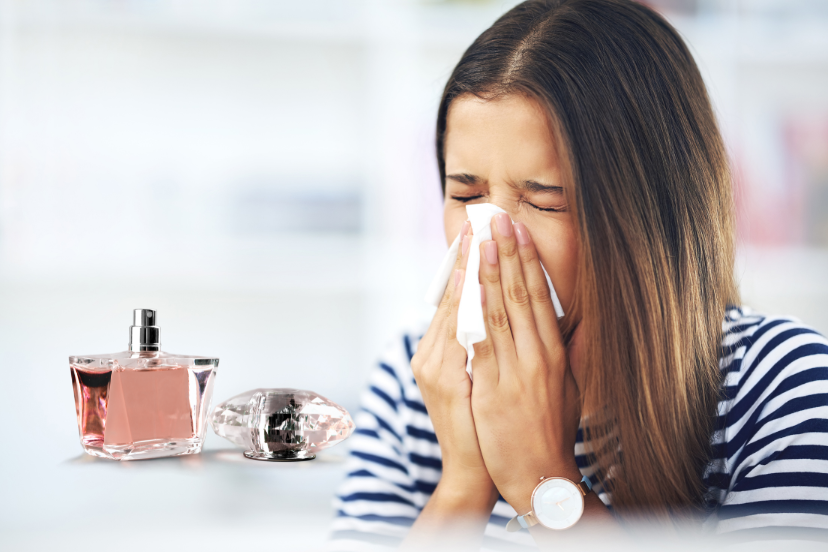Fragrance Sensitivity: Navigating the Invisible Allergen
Introduction
Scented candles, perfumes, and air fresheners are a ubiquitous part of modern life. They can make our homes feel cozy and inviting or help us express our unique personality. But for some, these everyday fragrances can be more foe than friend. This brings us to a crucial topic – Fragrance Sensitivity. In this comprehensive guide, we’ll delve deep into understanding fragrance sensitivity or perfume allergy, its causes, and how to manage it effectively.
What is Fragrance Sensitivity?
Fragrance sensitivity, also known as multiple chemical sensitivity (MCS), is a condition in which individuals experience adverse reactions to various chemicals and fragrances found in everyday products. These reactions can range from mild discomfort to severe respiratory issues, headaches, and even skin rashes.
Common Symptoms of Fragrance Sensitivity
- Respiratory Distress: Individuals may experience coughing, sneezing, shortness of breath, or even asthma-like symptoms when exposed to fragrances.
- Headaches: MCS can trigger debilitating headaches that last for hours or even days.
- Skin Irritations: Some people may develop redness, itching, or hives when exposed to certain fragrances.
- Nausea: An overpowering fragrance can induce feelings of nausea or even vomiting in sensitive individuals.
- Watery Eyes: Irritation of the eyes leading to excessive tearing is another common symptom.
- Difficulty Concentrating: This allergy can also affect cognitive function, making it hard to concentrate or focus on tasks.
- Fatigue: Prolonged exposure to fragrances can leave individuals feeling exhausted.
Causes of Fragrance Sensitivity
Understanding the causes of fragrance sensitivity is essential for effective management. While it can vary from person to person, several factors may contribute to this condition:
- Environmental Factors
- Exposure to a high concentration of synthetic fragrances in the environment can trigger MCS.
- Genetic Predisposition
- Some individuals may have a genetic predisposition to developing sensitivity to certain chemicals and fragrances.
- Chemical Overload
- Long-term exposure to various chemicals in everyday products can overload the body’s detoxification systems, leading to sensitivity.
- Immune System Dysfunction
- An imbalanced immune system can heighten the body’s response to fragrances and chemicals.
Diagnosing Fragrance Sensitivity
If you suspect you have fragrance sensitivity, seeking a diagnosis is crucial. However, it’s important to note that diagnosing MCS can be challenging, as it shares symptoms with other conditions. To reach a diagnosis, healthcare professionals may:
- Conduct Medical History Interviews: Gathering information about your symptoms, medical history, and potential exposures to fragrances.
- Perform Allergy Tests: Skin prick tests and patch tests can help identify specific fragrance allergens.
- Elimination Diet: Some healthcare providers may recommend eliminating fragrances and chemicals from your environment to see if your symptoms improve.
- Lung Function Tests: These tests assess respiratory function, which can help in cases where MCS primarily affects the respiratory system.
Managing Fragrance Sensitivity
Living with fragrance sensitivity requires careful management to minimize exposure and alleviate symptoms. Here are some strategies to help you cope:
- Identify Triggers: Keep a diary to track when and where you experience symptoms, helping you pinpoint specific triggers.
- Choose Fragrance-Free Products: Opt for fragrance-free or hypoallergenic products, including soaps, detergents, and cosmetics.
- Ventilate Your Space: Ensure proper ventilation in your home and workplace to reduce indoor air pollutants.
- Communicate Your Needs: Inform friends, family, and coworkers about your fragrance sensitivity so they can make accommodations.
- Use Protective Measures: Wearing a mask or using an air purifier can reduce your exposure to fragrances in public spaces.
- Seek Medical Advice: Consult with an allergist or immunologist for guidance on symptom management and potential treatments.
FAQs About Fragrance Sensitivity
Let’s address some common questions about the allergy:
Q1: Can fragrance sensitivity develop over time?
A1: Yes, it can. Long-term exposure to fragrances and chemicals can sensitize individuals over time.
Q2: Are natural fragrances safer for those with sensitivity?
A2: Not necessarily. Natural fragrances can also trigger sensitivity reactions in some individuals.
Q3: Can this allergy be cured?
A3: There is no cure, but symptoms can often be managed through avoidance and medical intervention.
Q4: Are there any medications to alleviate MCS symptoms?
A4: Antihistamines and corticosteroids may help manage symptoms in some cases.
Q5: Can fragrance sensitivity impact mental health?
A5: Yes, the chronic nature of MCS can lead to anxiety and depression in some individuals.
Q6: Can children have fragrance sensitivity?
A6: Yes, children can develop MCS, although it’s more common in adults.
Conclusion
In a world filled with an ever-increasing array of fragranced products, understanding and managing MCS is paramount. Whether you’ve recently developed sensitivity or have been dealing with it for years, the strategies discussed here can help you regain control over your environment and minimize the impact of MCS on your daily life. Remember, you’re not alone in this journey, and seeking support from healthcare professionals and advocacy groups can make a significant difference in your quality of life. By staying informed and taking proactive steps, you can navigate the challenges of fragrance sensitivity with confidence.




